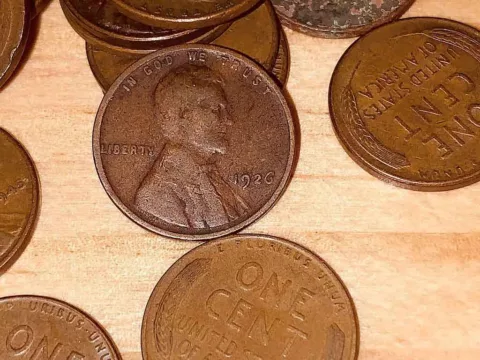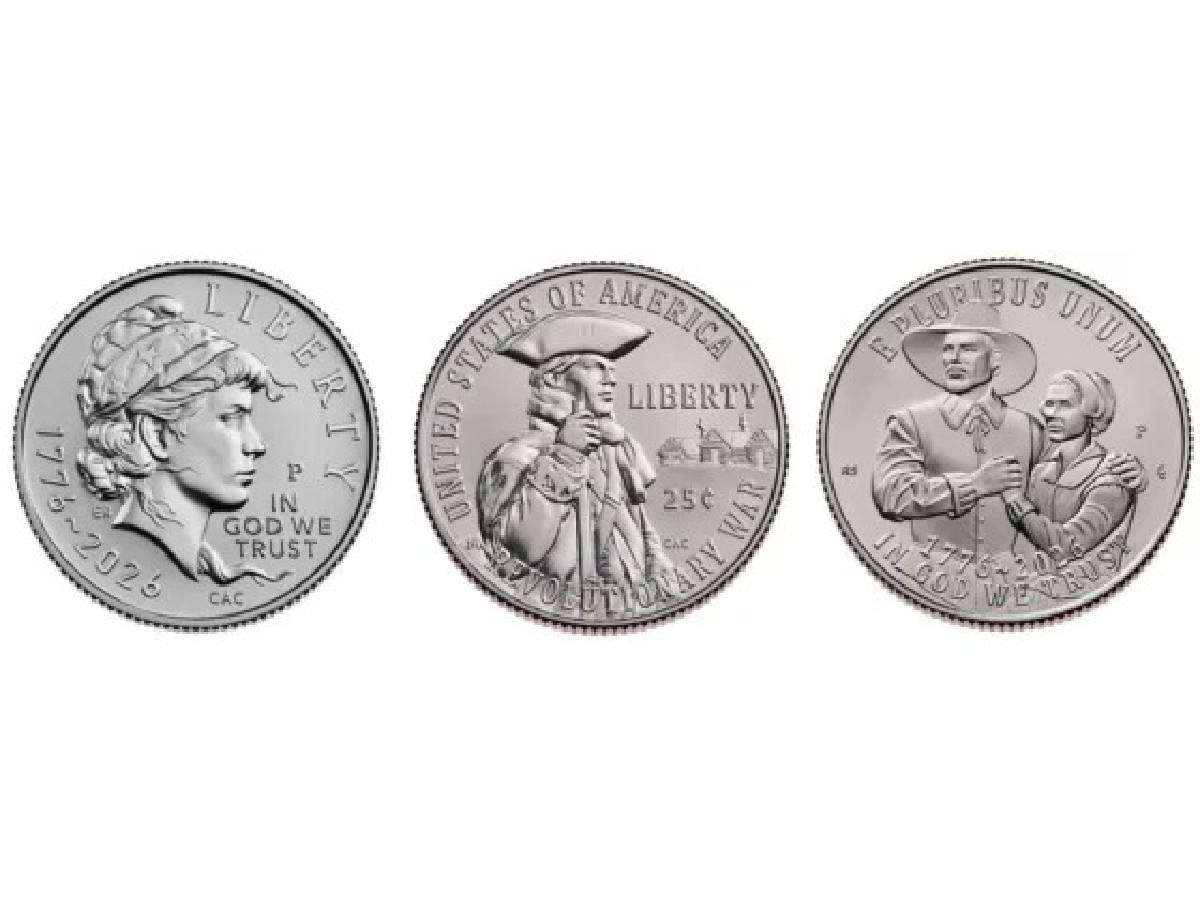
Do you have a 1926 penny and want to know its value?
Some 1926 Lincoln cents are worth only a few cents, while others are worth much more.
So how do you know if your 1926 wheat penny is worth just a handful of change or a fistful of dollars?
I’m going to share with you all that you need to know about the 1926 Lincoln cent, including:
- How to determine the value of a 1926 penny
- The importance of the mintmark on these old wheat pennies
- What kinds of errors can be found on 1926 pennies and what they’re worth
- How many 1926 pennies were made
An Overview Of All 1926 Penny Values
So, let’s get right to the bottom of this…
Most 1926 pennies are worth less than $1 — and many of those are worth only 10 or 20 cents.
However, there are a few that are actually worth nearly $100,000!
How do you know if you’ve got that 1926 Lincoln cent worth a few cents or a few figures?…
These are some of the factors that go into determining how much your 1926 wheat penny is worth:
- Condition — This one’s a huge consideration, because the really valuable 1926 pennies are the ones that are in tip-top shape.
- Mintmark — Do you see a little letter under the date of your 1926 penny? That’s the mintmark. The “D” on a 1926-D penny indicates that it was made at the Denver Mint. The “S” on a 1926-S penny means it was made in San Francisco. Don’t see a mintmark on your 1926 penny? That tells you it was made at the Philadelphia Mint.
- Errors — Some 1926 wheat pennies have mistakes, and these are worth extra money. How much extra depends on the type of error, which I’ll tell you more about in a minute.
Alright, now let’s figure out how much your 1926 Lincoln cent is worth…
1926 Penny Values (By Type)
Here are the 3 types of 1926 pennies and their current value:
#1 – 1926 No Mintmark Penny Value
1926 Lincoln cents from the Philadelphia Mint are the most common of the pennies struck at the United States Mint that year. A total of 157,088,000 were made, although most of these were spent as money leaving behind relatively few today in uncirculated condition.
Of perhaps 16 million survivors, coin experts believe fewer than 20,000 are available in uncirculated condition. And of these, few exhibit their original “red” color — that famous orangey hue that most brand new pennies have.
Here are the current values of 1926 no mintmark pennies:
- A circulated 1926 penny that is well worn is worth between 15 and 50 cents.
- An uncirculated 1926 penny with a brownish color is worth $7 to $20.
- An uncirculated 1926 penny with red color has a value of $30 and up.
NOTE: One of the most valuable 1926 Lincoln cents from the Philadelphia Mint was graded MS-67+ and graded by Professional Coin Grading Service (PCGS) sold for $2,880 in 2018.
#2 – 1926-D Penny Value
The 1926-D penny had a lower mintage than its Philly counterpart, with only 28,020,000 pieces struck. The 1926-D penny is therefore much scarcer and more valuable across the board than the 1926 no mintmark cent.
Here are the current values of 1926-D wheat pennies:
- A circulated 1926-D penny with moderate to heavy wear is worth $1 to $5.
- A circulated 1926-D penny with light wear has a value of about $10 to $25.
- An uncirculated 1926-D penny with a brown surface is worth $65 and up.
NOTE: The most valuable 1926-D penny ever sold was graded MS-66 Red by PCGS and sold for $9,600 in 2018.
#3 – 1926-S Penny Value
The 1926-S penny is considered a conditional rarity — meaning it’s rare in a certain grade. In this case, a high-end uncirculated 1926-S penny is MANY times rarer than even the 1909-S VDB penny. This piece actually holds the all-time price record for a non-error, regular-strike Lincoln cent — with an example selling in 2006 for a whopping $149,500!
It’s believed that maybe 1,500 1926-S Lincoln cents exist in uncirculated condition and only about 5 in MS-65 Red condition — surely much fewer than the 20,000 or so surviving 1909-S VDB pennies!
In circulated condition, 1926-S wheat pennies are somewhat scarce, and certainly much more common than the 1909-S VDB Lincoln cent. There are around 450,000 circulated 1926-S pennies in existence — making them plentiful for collectors. Even still, the number of survivors represents only about 10% of the issue’s original mintage, which was 4,550,000 pieces.
Here are the current values of 1926-S wheat pennies:
- A heavily circulated 1926-S penny is worth $7 to $15.
- A lightly circulated 1926-S penny is worth $30 to $50.
- A chocolate-brown uncirculated 1926-S penny is worth $100 or more.
- A red uncirculated 1926-S penny has a value of $1,500+.
NOTE: Values listed above are for coins that aren’t cleaned or have any signs of damage. Cleaned coins and those with signs of damage — such as holes, bends, heavy nicks and scratches, or other problems are worth much less.
IMPORTANT: What Is The Grade Of Your 1926 Penny?
To determine the true value of your 1926 wheat penny, you first need to know what condition (or grade) your coin is in.
Grab a coin magnifier and a copy of the U.S. Coin Grading Standards book. Then, watch this video to see how to grade coins yourself at home:
These are the best coin grading apps that make grading coins yourself much easier.
A List Of Rare 1926 Penny Errors
All old error coins are pretty scarce, and 1926 wheat pennies struck with errors (and/or containing other oddities) are particularly hard to find.
Here are some of the errors you may be able to find on 1926 Lincoln cents and what these pieces are worth:
1926 Doubled Die Pennies
Doubled die coins are among the most popular of errors in the numismatic world — and that’s particularly true with pennies. While 1926 doubled die pennies aren’t as widely known or as popular as the 1955 doubled die cent, there are a few worthwhile things to look for among the 1926 wheat cents.
Notably, there are reports of some 1926 wheat pennies with Lincoln on the obverse (heads side) of the penny exhibiting an extra eyelid.
Not many of these trade, so prices are hard to pin down. But doubled dies with similar errors have sold for between $75 and $150.
1926 Pennies With Off-Center Errors
I love off-center coins… You know why? They just look so weird! I mean, these coins are so mis-stamped it’s almost ridiculous. Sometimes only half the design is left on these coins — and often even less than that.
Most of the significant off-center coins are only 5 to 10% off, but that’s enough to catch the eye — and it’s the eye-catching off-center error coins that are worth some dough.
As for off-center 1926 pennies, many of the pieces that are about 10% off center are worth $25 to $50. The more off-center (as long as the full date still showing), the more a piece is worth. If you happen to snag a 1926 off-center penny that’s 75% or more off center, it’s worth potentially hundreds of dollars!
1926-D and 1926-S Pennies With Repunched Mintmarks
Repunched mintmarks are interesting varieties in which the working die was struck by the mintmark punch at least twice. This happened when the die worker was trying to bring up the original impression left by the first punch a little more. Often, this resulted in the mintmark being struck in 2 distinct positions.
These pieces are worth a bit of money. A 1926-D penny or 1926-S penny with a repunched mintmark is generally worth $7 to $15.
1926 Pennies With BIE Errors & Other Die Breaks
Aging and overworked dies often show their stress in the form of little cracks, chips, and breaks on the surface. When struck, these sunken breaks and chips show up as raised lines on the surface of a coin.
Die breaks are desirable error varieties, and many collectors pay premiums for such coins when the die breaks and chips are drastic or occur on a prominent area of the coin. One of the most popular types of die break varieties on pennies are those involving a little line, or crack, that commonly forms between the “B” and “E” of “LIBERTY” on the obverse. These are called BIE errors.
While most often encountered with 1950s and 1960 pennies, BIE varieties can be found on 1926 wheat pennies, and they are commonly traded for between $5 and $15.




